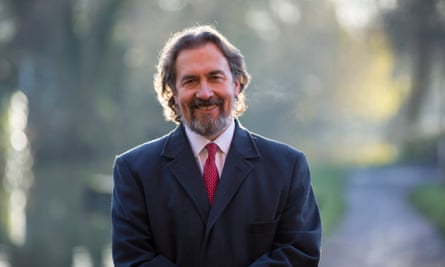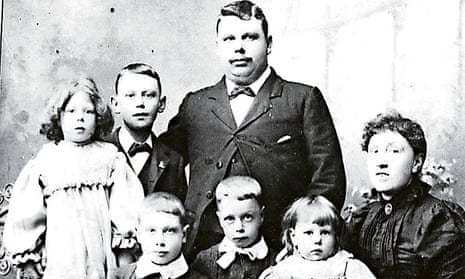There was always something different about my grandfather. I was only 11 when Charles Edward Bradshaw died but I knew, even then, that he had lived a charmed life. He had come through the first world war with little more than a scratch. He had risen rapidly from private to regimental sergeant major. He was offered a commission in France several times but, having seen all his officers mown down leading charges, sensibly declined. He was a superb shot, however, and in 1919 was sent to Dublin as an army sniper. He said the only time he was in serious danger in Ireland was when he was escorting a midwife and the IRA let him through.
I have no memories of him without a cigarette in his hand. He smoked 80-100 a day and yet he died suddenly of a heart attack at the age of 78 without illness or any warning. He had the sadness of losing his son in north Africa during the second world war and his wife died in 1953, but my grandfather soon remarried. When his second wife died, he found a series of women who happily looked after him.
In the family he was known as Wag. There was indeed something waggishly handsome about him. To me he was an improbable combination of Andy Capp and Cary Grant. “If our Charlie fell off the roof at Lewis’s, he’d fall into a new suit,” said his mother.
But there was something else that was different about him. Charlie was finer featured and darker-skinned than his rather lumpen brothers and sisters. His daughter, my mother, inherited this complexion. She also tanned quickly, and when I was a teenager we nicknamed her Mrs Gandhi. She had the same white rings round her eyes and the same hooded eyelids as the Indian prime minister.
I thought nothing about this until I went to a homeopath a few years ago, hoping to avoid surgery. When we went through my medical history she asked an unusual follow-up question. Were any of my relatives from the north of India? Evidently my list of health issues was much more typical of people who live north of Delhi than in Britain.

Recently, when my mother was dying, I heard a lot of family history and met distant family members who filled in some details. It seems Charlie had left home as soon as he could because when his father, Harry Bradshaw, was drunk he used to beat him up. Looking at the family photos, I noticed how physically very unlike his brothers and sisters my grandfather was. They were all clones of their father. By comparison, my grandfather, the firstborn, looked like an interloper.
When I checked the records, I noticed that Charlie was born almost embarrassingly soon after my great-grandparents’ wedding – less than three months. Some family members had suspected at the time that my great-grandmother had been unable to marry the father of her unborn child and settled at the last minute for a local boy. Might this have been the cause of my great-grandfather’s antagonism towards their first child?
So I pieced together the elements of this story. Was it possible my biological great-grandfather was Indian – hence the “Indian” illnesses in our family and darker skin? My great-grandmother had never been out of the country, but there were Indians living in England long before the mass immigration after the second world war. London’s first “Hindustan” curry house opened in 1810.
By the time I’d worked this hypothesis out, it was too late to have a sensible conversation with my mother. Besides, how might she – who had always considered herself very English indeed – react to being told she might be a quarter Indian?
After my mother’s death, I tried asking her cousins about this story, but Uncle Charlie was much loved and I got the impression no one liked the idea that they might be less closely related to him than they thought.
Nevertheless, the idea nagged at me so eventually I contacted a company called Oxford Ancestors. They had recently discovered that my ex-wife’s father had a DNA connection with Joseph Stalin’s people. The time was ripe, it seemed, for me to join this fashion for digging up the past.
Unfortunately, it turned out that DNA-testing is a more limited tool than popularly thought. Oxford Ancestors explained that it can tell me a lot about my father’s patrilineal line and my mother’s matrilineal line but the only way to explore my mother’s patrilineal line would be to get a DNA sample from her father’s son, my uncle, who is buried at El Alamein. Which I am not going to do. There’s a limit to how much digging around in the past I’ll do.
So, the short answer is that I do not know and will not know if my grandfather’s biological father came from northern India. However, I’ve come to realise that even if he did, it would change nothing. Charles Edward Bradshaw had a direct influence on my life because I knew him for 11 years and I do feel that I have inherited certain aspects of his character. I can’t shoot straight, but I have fallen off buildings into new suits on several occasions.
And my grandfather had a huge indirect impact on me because he brought up my mother. The daughter of a regimental sergeant major had to be perceived as beyond reproach. And she could never get what she wanted by confrontation – you can’t out-shout a sergeant major – so she learned how to manipulate the men around her. She also grew up inhibited about expressing affection, another consequence of her father’s drill-sergeant manner. And because my grandfather was quite a ladies’ man, my mother’s childhood was plagued by the fear of divorce, so she married a man (my father) who was clearly devoted to her. All these things affected me. Some in a good way, some less so.
But my grandfather would have been who he was by dint of his upbringing and profession, regardless of whether Harry Bradshaw was his father or whether it was a near neighbour or a prince from the north Indian plains who got my great-grandmother pregnant.
There is a glamour to thinking we might have a Thorn Birds-style romance in our past, but this is just a modern version of the fairytale idea that each of us is really a prince or princess kidnapped and brought up as peasants. But we are who we are now. Who my grandfather’s father was does not matter. What shaped me was not that shadowy figure, dead long before I was born, but the fact that my grandfather was beaten up at home and ran away to join the army and survived the first world war.

Comments (…)
Sign in or create your Guardian account to join the discussion